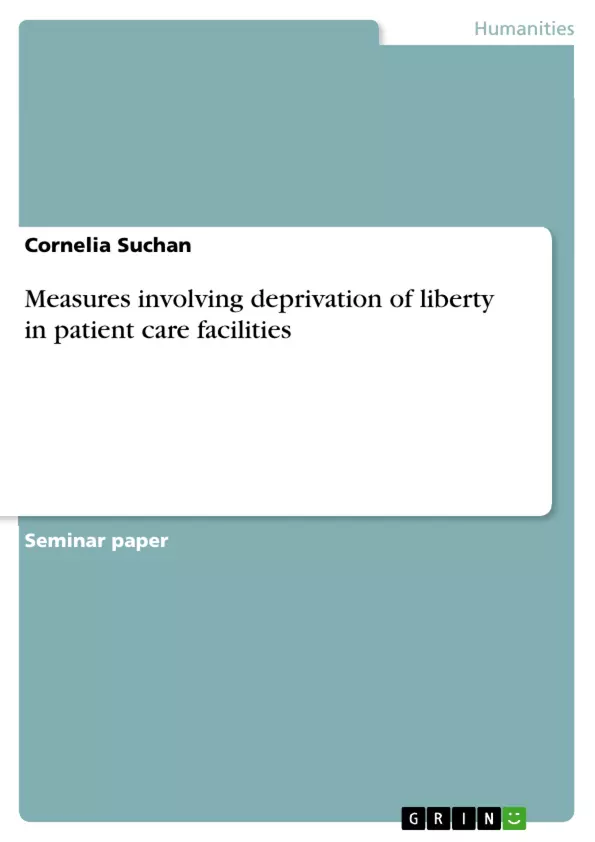In nursing, nursing staff are repeatedly confronted with ethical questions and problems. Very often they are confronted with situations that require them to decide on the right course of action and to weigh up different values and interests. One such case is that of measures involving deprivation of liberty. Thus, nursing staff are constantly caught between their (own) thoughts of protection and the residents' claim to freedom. Of course, there are legal guidelines according to which the nursing staff must act, but these are often not sufficient for a concrete decision for or against a measure that deprives a person of his or her freedom. The nursing staff is nevertheless obliged to weigh up the two legal interests: the duty of care to preserve physical integrity and the fundamental right to personal freedom. This problem can lead to an ethical conflict for nursing staff, whereby there can be no general solution but rather the respective interests must be negotiated in the concrete situation, but also the respective advantages and disadvantages must be taken into account. Measures that deprive residents of their liberty thus represent a tightrope walk by the nursing staff between the duty to protect and the residents' right to self-determination.
Inhaltsverzeichnis (Table of Contents)
- Introduction and problems
- Forms of deprivation of liberty
- Legal aspects
- Empirical studies on freedom-restricting measures
- Ethical aspects
- Possibilities of ethical decision-making
- Conclusion
Zielsetzung und Themenschwerpunkte (Objectives and Key Themes)
This text explores the ethical complexities surrounding deprivation of liberty measures in nursing homes, particularly focusing on the dilemma faced by nursing staff when balancing residents' right to freedom with the duty of care to ensure their safety and well-being.
- Ethical considerations in nursing
- Deprivation of liberty measures in nursing homes
- Legal framework for freedom-restricting measures
- Empirical research on the use of these measures
- Ethical decision-making in nursing practice
Zusammenfassung der Kapitel (Chapter Summaries)
- Introduction and problems: This chapter introduces the ethical challenges faced by nursing staff in dealing with deprivation of liberty measures, highlighting the conflict between residents' right to freedom and the need for safety precautions. It also underscores the frequency of these measures in nursing homes and the need for a nuanced approach to balancing these competing interests.
- Forms of deprivation of liberty: This chapter defines deprivation of liberty measures and outlines their various forms, including mechanical restraints, environmental restrictions, and the use of medication to control residents' movements.
- Legal aspects: This chapter examines the legal framework surrounding deprivation of liberty measures, exploring the rights of residents and the responsibilities of nursing staff. It delves into the legal distinction between deprivation, deprivation of liberty, and restriction.
- Empirical studies on freedom-restricting measures: This chapter presents empirical studies that illustrate the extent and impact of deprivation of liberty measures in nursing homes. It provides insights into the prevalence, types, and consequences of these measures.
- Ethical aspects: This chapter focuses on the ethical considerations surrounding deprivation of liberty measures in nursing. It explores conflict situations and moral dilemmas faced by nursing staff, examining different ethical theories that can inform decision-making in care settings.
- Possibilities of ethical decision-making: This chapter explores strategies and frameworks for making ethical decisions in the context of deprivation of liberty measures. It aims to provide practical guidance for nursing staff facing these dilemmas.
Schlüsselwörter (Keywords)
Key themes and concepts explored in this text include deprivation of liberty measures, nursing ethics, freedom restrictions, legal frameworks, ethical decision-making, empirical studies, and residents' rights.
Frequently Asked Questions
What are considered deprivation of liberty measures in nursing?
These include mechanical restraints (like bed rails), environmental restrictions (locked doors), and medication used to limit a resident's movement.
What is the ethical conflict for nursing staff regarding these measures?
Nurses face a "tightrope walk" between their duty of care to ensure physical safety and the resident's fundamental right to personal freedom and self-determination.
Are there legal guidelines for restricting a resident's freedom?
Yes, there are strict legal frameworks that distinguish between deprivation and restriction of liberty, requiring a careful weighing of legal interests.
Why are these measures used in patient care facilities?
They are often intended to protect residents from falls or wandering, but they raise significant moral dilemmas regarding the quality of life and autonomy.
How can nursing staff make better ethical decisions in these cases?
The text suggests using ethical frameworks and strategies to negotiate interests in concrete situations, considering both advantages and disadvantages of the measure.
- Citation du texte
- Cornelia Suchan (Auteur), 2005, Measures involving deprivation of liberty in patient care facilities, Munich, GRIN Verlag, https://www.grin.com/document/1187351



